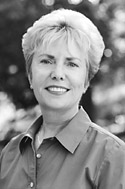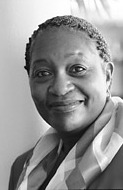|
Candidates
Who Can October 2002 Local 535 members can participate in races where their vote will really make a difference. Contra Costa Supervisor Donna Gerber and San Diego’s Vince Hall are running neck and neck against their opponents for the state Assembly, and Local 535 executive board delegate Doris Wallace is running a strong campaign in her district. These races will determine who controls the state Assembly and whether the Assembly votes to increase funding for social services or for further cuts. The winner is likely to be determined by only a few votes. The Dragon interviewed the three candidates.
Donna Gerber has a long history of both understanding and effectively fighting for labor issues. She is a former Local 535 member and former union representative for several SEIU locals and the California Nurses Association. During her two terms on the Contra Costa Board of Supervisors she helped In Home Support Services workers gain the right to collective bargaining and spearheaded the effort to re-open the Kaiser Hospital emergency room, an emotional issue for Local 535 members. Local 535 member Willa Hives died from a heart attack without ever receiving proper emergency care because of hospital closures in Contra Costa. As a former children’s protective services worker she has worked on legislation to help workers who experience domestic violence. She is especially concerned with the workload and caseload issues confronting social workers. “When the CWS/CMS computer system caused tremendous workload problems for social workers, I had an appreciation for how technology that makes a job harder isn’t much of a help,” Gerber recalls. “We intervened and asked the department to stop blaming the workers, to problem-solve around the computer system, and to get additional clerical staff to relieve some of the workload on social workers. I wish we could get rid of the computer system, but there is too much money behind it. So at least we can have a reasonable perspective and do what we can to keep the technology from becoming more of a problem for workers and clients than it already is.“ Gerber is also taking on another issue confronting social workers, the dependency courts system. As with the computer system, she acknowledges there is no easy answer, but she is willing to work for whatever progress can be made, and most importantly, to try to prevent the brunt of the crisis from falling on workers. “We have tried to advocate for the social workers in the court system and keep pushing the county administration and Human Services Department to work harder with the judges to resolve the conflicts,” Gerber explains. “We want the department to provide social workers more assistance from the county counsel’s office. We haven’t solved everything, but I have let the department know that as a member of the board of supervisors, I expect them to protect their own employees, even if that means arguing with a judge. When there is a disconnect between the judges and social workers, the department needs to protect the workers or else social workers can become the scapegoat. Judges need to be told when delays are not the worker’s fault. It is hard for workers to do that. If there needs to be a meeting between the department and the judiciary, we can direct that meeting to occur. We have done that before.” Retention of workers is particularly important at this time of budget cutbacks, and a supportive management can make all the difference. “From my own experience as a former child protective services worker, I know that the quality of the work environment is what makes people choose to continue,” Gerber says. “It is a difficult job. Our workers have clients with multiple problems and the workers lack resources and time that should be available. Therefore, creating an atmosphere of mutual trust between labor and management is even more important.” The Dragon asked Gerber what her main focus would be if elected to the state legislature. She responded, “Next year is going to be very tough, with a lot of budget cutbacks. I hope to be on the budget committee so that I can make sure that health and human services don’t continue to be the chopping block of choice.”
Local 535 state executive board delegate Doris Wallace is running for the 63rd Assembly District. Prior to running for statewide office she was elected to the Cucamonga School Board. “I have been working in the public sector for the last 25 years as a social worker and school board member,” Wallace says. “I’ve seen how lots of kids, when they come into school from living in a poverty area, some of the teachers sometimes assume they can’t learn. As a school board member I’ve told the teachers, ‘You must accept the child in that classroom. You start where the child is at the time. Don’t say where the child has been.’ I want to assure that all children have a good quality education. “On the Cucamonga School Board we have adopted a policy that all children are capable of learning. We have increased the number of credentialed teachers. We have also adopted the policy that teachers with emergency credentials have five years to get their full credentials. “When elected to the Assembly I will work hard to have smaller classroom size, because if you have more than 23 students, a teacher can’t teach. As a social worker, I understand the caseload issue.”
VINCE HALL, 78th District Vince Hall, an affiliate member of SEIU, has served in government for many years, including as staff director for Governor Gray Davis. He has been a strong advocate for protecting social services and local government funding. “I think social services have been vastly underfunded and that the crux of the problem is structural,” Hall says. “You have one group of elected officials, the state legislators, responsible for funding the services, and another group of officials at the county level responsible for delivering the services. I believe the state has a moral obligation to make sure that social services are fully funded at the county level, and to make the counties accountable for delivering those services. We have a further moral imperative not to balance the state budget on the backs of the poor, the disadvantaged, the youth, and the seniors–the people who are dependent on county services for some minimal quality of life. “The most important point I want to make is that I want to build a partnership with Local 535 and other labor organizations that represent the people on the front lines of providing services to generate ideas on how best we can fix this broken fiscal relationship.”
|
|||||||||

 Donna
Gerber, 15th District
Donna
Gerber, 15th District Doris
Wallace, 63rd District
Doris
Wallace, 63rd District 